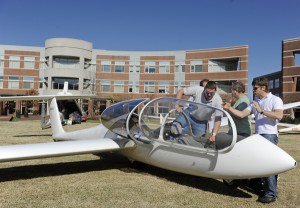Aerospace engineering is the application of science and engineering principles to the design, development, and implementation of systems or vehicles that travel above the surface of the earth. The vehicles may include a variety of aircraft and spacecraft such as low-speed propeller-powered aircraft, high-speed jet-powered aircraft, remotely piloted vehicles, micro air vehicles, hovercraft, and helicopters, along with space related vehicles and systems that include rockets, spacecraft, space stations, planetary rovers and various specialty equipment such as heat shields, and other protective and deployment devices. The design of these vehicles and systems is both difficult and challenging because they must operate reliably and efficiently in harsh environments. Aerospace Engineering is intimately involved in the design, manufacture, control, and operation of these systems coupled with a consideration of environmental, economical, ethical, and social issues.
The program is supported with laboratories where students obtain hands-on experience with state-of-the-art instrumentation and computers. Low-speed and high-speed wind tunnels and structural and material facilities are used for testing prototype models. A prominent feature of the program is the students’ involvement in design, construction, and flight-testing of novel aircraft designs, a pedagogical device pioneered by the Aerospace Engineering Program at NC State University. The spacecraft design involves construction and flight readiness testing of satellites and spacecraft. In addition, the program is supported by strong research activities and dedicated faculty who provide personalized attention to students.
In addition to related industries such as the automotive industry, Aerospace Engineering graduates are typical employed by government laboratories such as NASA, NAVAIR, and the Air Force, a wide variety of aerospace industries, or they attend graduate school to pursue advanced degrees.
Courses include:
Aerospace Vehicle Performance, Space Flight, Aerodynamics, Aerospace Structures, Stability & Control, Propulsion, Senior Design Project*
* The senior design project in aerospace engineering is a year long team activity involving hands-on UAV or space systems design, fabrication, and testing. A written report and presentation are included.
Additional Information:
In’s and Out’s of Engineering CODA
Video: Engineering Majors Exploration
Video: The Creativity of Engineering at NC State
14 Grand Challenges for Engineering
| College | |
| Discipline |
|
| Academic Department |
|
| Departmental Contact | |
| Major Overview | |
| Plan Requirements | |
| Semester Sequence | |
| Skills You Could Develop |
|
| Learn More About This Major | |
| Career Titles | |
| Learn More About Careers |
